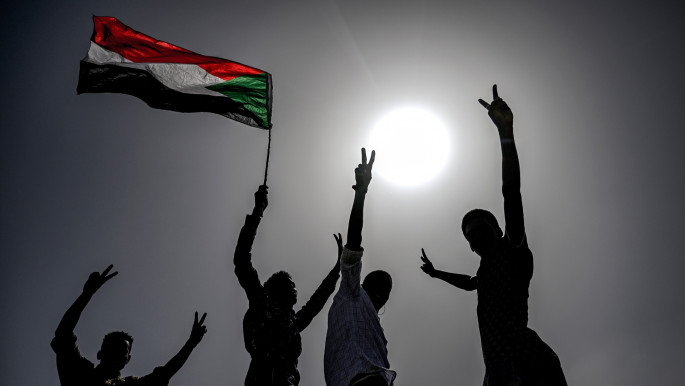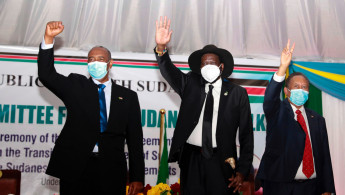Will Sudan's historic deal with rebels finally bring peace?
Rebels in the Black-majority region of Darfur launched an insurrection against Sudan's Arab-led security forces in 2003.
Since 2011, insurgencies have also simmered in the Blue Nile and the Nuba Mountains, two other regions with large Black populations. In the past, the Sudanese military responded with campaigns of ethnic cleansing.
On 31 August, Sudan's transitional government took a significant step to reverse this historical trend. Sudanese officials announced that they had concluded a peace treaty with two of Darfur's most prominent rebel groups: the Justice and Equality Movement (JEM) and the Sudan Liberation Movement/Army (SLM/A).
In exchange for Sudan's provisional government making a series of long-awaited reforms, the rebel groups will disarm and join Sudan's armed forces.
Since taking power last year, Sudan's new leaders have pledged to correct their predecessors' mistakes. In April 2019, the Sudanese military launched a coup d'état against President Omar al-Bashir - Sudan's leader of thirty years - after months of protests against his autocratic rule.
 |
Omar al-Bashir orchestrated the subjugation of Darfur, the Blue Nile, and the Nuba Mountains, leading the US to accuse him of genocide |  |
In addition to stifling the opposition in Khartoum, al-Bashir orchestrated the subjugation of Darfur, the Blue Nile, and the Nuba Mountains, leading the United States to accuse him of genocide. In 2009, the International Criminal Court (ICC) charged him with crimes against humanity.
In the wake of al-Bashir's downfall, an interim government bringing together Sudan's top civilian and military leaders took charge of the country's transition.
 |
|
| Read more: For Sudan's women, the fight against FGM has only just begun |
Sudanese officials have strived above all to overcome Sudan's reputation as a pariah state and reintegrate the country into the international community, hoping to pave the way for foreign direct investment and humanitarian aid. Resolving the conflicts in Darfur and other regions has formed a key part of that effort.
So far, the international community has received Sudan's attempt at conflict resolution well. Norway, the United Kingdom, and the United States, which diplomats and journalists have termed the "troika" supporting the normalisation of Sudan's ties with the Western world, heralded the political settlement with JEM and the SLM/A.
They called it "an important step in restoring security, dignity, and development to the population of Sudan's conflict-affected and marginalized areas." The European Union also welcomed the agreement.
While the peace treaty provides a roadmap to the kind of comprehensive peace that Sudanese leaders desire, putting a stop to sectarian violence in Darfur and elsewhere will require serious legwork. A powerful SLM/A faction led by the Paris-based warlord Abdel Wahid al-Nur has refused to participate in the peace process, and the primary rebel group in the Blue Nile and the Nuba Mountains has its own reservations.
 |
As far as Sudan still has to go, the peace treaty demonstrates that the country is beginning to make amends for al-Bashir's atrocities |  |
The Sudan People's Liberation Movement-North (SPLM-N), the face of the rebellion in the Blue Nile and the Nuba Mountains, withdrew from negotiations with Sudanese officials after they declined to replace their top negotiator, General Mohamed Hamdan Dagalo. The general, whom most Sudanese call "Hemeti," stands accused of perpetrating atrocities in Darfur, the Blue Nile, the Nuba Mountains, and even Khartoum.
Hemeti's presence at the negotiating table speaks to the wider challenges confronting Sudan's new leadership as it tries to bring peace to the country's marginalised regions.
 |
|
| Despite US pressure, Sudan's cost-benefit analysis puts normalising ties with Israel on hold, for now |
Though the interim government has shown its willingness to engage with rebel groups, questions remain about Sudanese officials' readiness to enact the kinds of far-reaching reforms necessary to end decades of racial discrimination.
Al-Bashir's departure notwithstanding, many of the generals who orchestrated the worst episodes of sectarian violence in Darfur, the Blue Nile, and the Nuba Mountains retain significant influence in the transitional government. Hemeti even serves as its deputy chairman.
Sudanese leaders appear to be moving in the right direction. They have pledged to deliver al-Bashir to the ICC, a long-time demand of rebel groups. Another step might include organising the repatriation of Darfuri child soldiers whom al-Bashir deployed to Yemen several years ago to support the Saudi campaign against the Houthis. Sudanese activists have been calling for the children's return to Sudan since last year.
The international community has its own recommendations for the Sudanese peace process. The Troika's statement noted, "We believe the formal agreement must be followed up with local peace and reconciliation efforts in the conflict-affected areas." As Sudan's transitional government works toward peace treaties with the SPLM-N, al-Nur's SLM/A offshoot, and other rebel groups, the support of world powers will likely prove crucial. So will cooperation with South Sudan, home to much of the rebel leadership.
Sudanese Prime Minister Abdalla Hamdok best described what the August 31 political settlement represents: "the beginning of the road to peace, a peace that needs a strong and solid will." As far as Sudan still has to go, the peace treaty with JEM and the SLM/A demonstrates that the country is beginning to make amends for al-Bashir's atrocities.
Austin Bodetti studies the intersection of Islam, culture, and politics in Africa and Asia. He has conducted fieldwork in Bosnia, Indonesia, Iraq, Myanmar, Nicaragua, Oman, South Sudan, Thailand, and Uganda. His research has appeared in The Daily Beast, USA Today, Vox, and Wired



